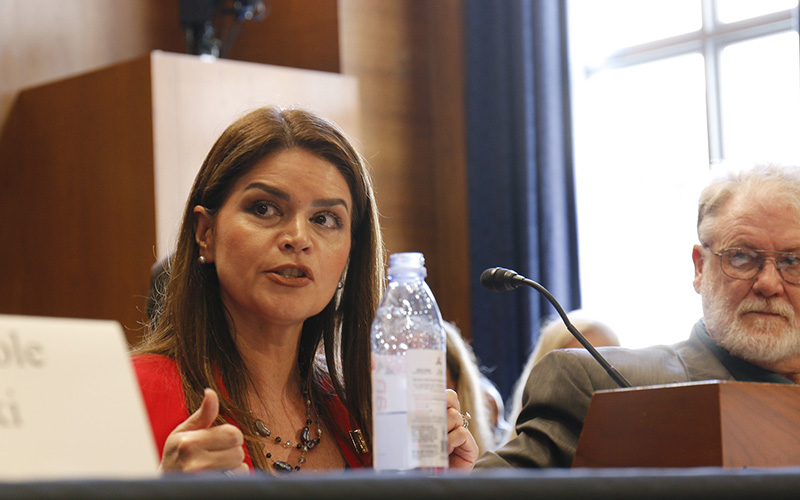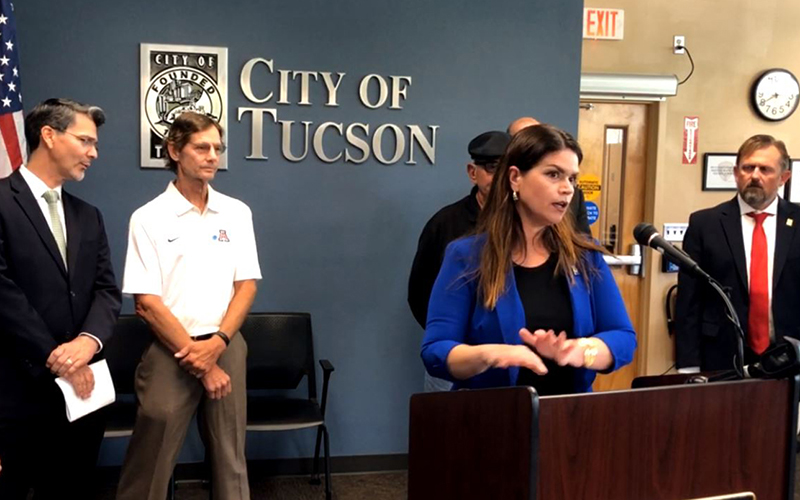WASHINGTON – Federal funding from the massive Bipartisan Infrastructure Law will be “critical” to Tucson’s ability to address contamination of the city’s water supply by the chemical PFAS, Mayor Regina Romero told a Senate panel Wednesday.
Romero was part of a group of city and state officials testifying on the local impact of the $1.2 trillion federal spending plan, which will fund everything from roads and rails to broadband and climate resilience. One witness told the Senate Environment and Public Works Committee that the law provides a “once in a lifetime opportunity to begin to invest in our nation’s infrastructure.”
Like most of the witnesses, Romero ran through a laundry list of city projects that are in line for infrastructure bill funding, including bridge replacement, electric vehicles and more. But she said the funds present an opportunity to address groundwater contamination by the hazardous chemical PFAS, which she said has already cost the city 10% of its water supply.
“Tucson Water has formally initiated the process … to request $141 million to address two PFAS priority projects with the Bipartisan Infrastructure Law funding,” Romero said in her written testimony.
“If approved, these projects would remove PFAS contamination from drinking water wells in areas most vulnerable to supply issues and from the reclaimed water system that serves the entire region,” she testified.
Perfluoroalkyl and polyfluoroalkyl substances – or PFAS – are so-called “forever chemicals” that linger in the environment and have been found in drinking water, food and people’s bloodstreams around the globe. The Environmental Protection Agency last month proposed designating the PFAS family of chemicals as hazardous because of their possible adverse health effects on people.
The chemicals are used in a variety of consumer and industrial products, including firefighting foam often used at airports and military bases. Arizona Democratic Sens. Mark Kelly and Kyrsten Sinema, who announced the release this week of $13.6 million in funding for PFAS cleanup in the state, said the chemical has been found in groundwater near Luke Air Force Base, Marine Corps Air Station in Yuma, the decommissioned Williams Air Force Base in Maricopa County – and Davis-Monthan Air Force Base in Tucson.
Romero said Tucson has spent $50 million so far to treat PFAS contamination in groundwater downstream from Davis-Monthan.
“Tucson has lost over 10% of our water supply to PFAS contamination,” she said.
It comes as water supplies throughout the Southwest are being stressed by falling levels in the Colorado River, another source of Tucson water supply. “We must protect our water,” Romero said.
Another infrastructure priority cited by both Romero and Kelly was a project to widen Interstate 10, a heavily traveled highway that is currently just two lanes in each direction for 25 miles between Phoenix and Tucson.
“This is good for Arizona, individuals, companies, and safety,” Kelly said at the hearing of the I-10 project.
Romero said truck and passenger vehicle congestion and accidents on I-10 lead to supply-chain issues for the state, and the nation.
“The flow of goods and services between our first and second cities is very cumbersome,” she said.

Tucson Mayor Regina Romero testified that water quality was just one of the city’s goals for the federal infrastructure funding, which also includes transit, bridge repair and climate resilience. (Photo by John Brown/Cronkite News)
Romero also cited funding to encourage development of Amtrak service between Phoenix and Tucson, which could reduce traffic on I-10 and encourage more people to use public transportation. Currently, there is no direct transit between Phoenix and Tucson.
While witnesses at the hearing, from Delaware and West Virginia as well as Romero, said they were appreciative of the infrastructure funding, one pointed to red tape that has made it hard to access the funds.
“Coordination with various federal agencies is chaotic at best,” said West Virginia Highway Commissioner Jimmy Wriston. While he said his state is grateful for the funding, he added that “eligibility requirements can be quite confusing and hinder the ability to obligate the money” under some programs.
But Kelly said the many parts of the infrastructure law make historic investments for more sustainable and equitable living in local communities. He called on both parties to take advantage of the infrastructure law.
That was echoed by Romero, who said the funding will help Tucson toward its goal of becoming “the surviving sustainable desert city of the future.”
“Through BIL funding, Tucson is building infrastructure investments that heal historic wounds, reconnect communities, and address the challenges that result from being on the front lines of climate change,” Romero said in her testimony.


